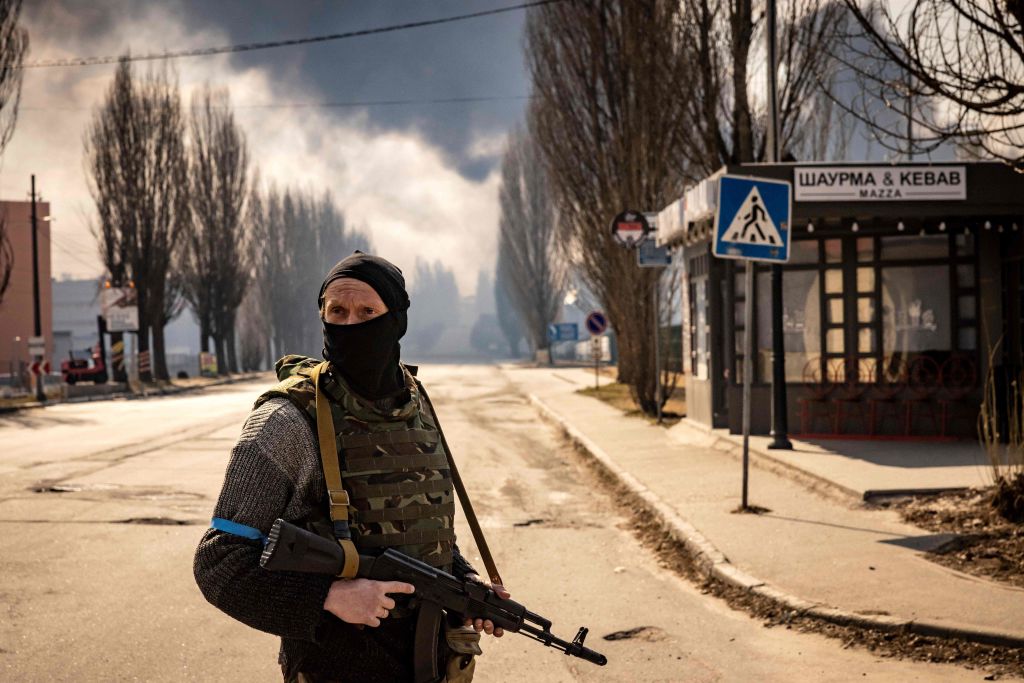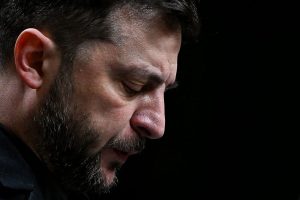I write this from my Kyiv air raid shelter. It has become my second home, an improvised bedroom, study and kitchen. For food, we eat bread and borscht. It is a spartan existence, but conducive to reflection. I still can’t get used to the siren that sounds five times a day, although I have got used to sleeping on the floor, in hallways, subways or the metro. I keep a bag packed with essentials by the door that I can grab and run with when the alarm sounds.
On the first night of the war, I spent the first hours in the subway, along with thousands of Kyivites. Nobody slept. Everyone sat in silence. From time to time in different parts of the platform, dogs barked, cats purred and, of course, babies cried. Despite the shock and gloom, life was struggling to make itself felt and remind us that we would have to persevere. Then we began reading the news. We were afraid to do so but we had to. A young sailor called Vitaliy Skakun had blown up a strategic bridge in the south to stop the damn Russians “bringing us liberation.” He paid the ultimate price for his heroism and was killed by the explosion. There have been thousands of such losses in the past four weeks. But they are not just statistics; they are people.
The Russian savages mask their barbarism with warped notions of their own superiority. But we have seen them for what they really are. Nothing can conceal the despotism that continues to drive them. Their Herzens and Sakharovs, few and far between in Russian history, have nothing in common with this Putinist monstrosity, preceded by Soviet and czarist prototypes. For almost a month, Ukraine has been falling asleep and waking up to the sound of explosions. Sometimes Ukrainians don’t wake up at all. How long will the Kremlin maniac be allowed to hold us all hostage to satisfy his obscene lust for power, greatness and empire?
These orcs destroy absolutely everything. They fire rockets at us. They send sabotage groups. They shoot indiscriminately at people in the villages and countryside. Near Kyiv is the town of Irpin. Or, I should say, there used to be a town called Irpin. It was full of young couples and their children, as well as lots of new buildings. It has been entirely destroyed by Russians determined to break through into Kyiv. And there are many more sites like this. One of my friends is based in the village of Velyka Dymerka, with no heating or light and almost no food. If someone tries to go outside, the occupiers shoot at them. They can’t even pick up the bodies of compatriots for burial because the Russians fire at them. My friend hasn’t been in touch for days.
The capital itself has become remarkably calm. Many people have left to seek safety, whether westward towards the borders with the EU, or to the regions. Missiles appear, but our air defenses usually shoot them down, although they do occasionally miss. Black smoke is often seen drifting over the city. Many of the city’s mirrors and windows have been smashed. Roads in the capital are empty. So are the parks. Even the shops are empty now. In the first days there were lines, but people seem to have stocked up. There is enough food, but medicines are in short supply. Today everyone is a “volunteer.” We all help as much as we can. Some give money, others food or medical items. Everyone donates to the army. We all want peace, but not at the price of submission.
I stayed in Kyiv, not because I am fearless, but because this is my land. I love every bit of it, every stone, every building in which I laughed, cried and slept. You never appreciate love for something until you start to lose it, or when some brute tries to forcibly take it away from you. I try to do my bit as a volunteer and by continuing my journalistic work. I’m a relatively young woman, but in recent days I’ve already seen lifeless and broken bodies, visited medical units tasked with saving the lives of our wounded defenders, and witnessed countless examples of quiet, unsung heroism. And all this in my capital city. I cannot even imagine the hell that my friends and colleagues are experiencing in Kharkiv, Mariupol and other areas under siege or temporarily occupied by the Russian hordes. If only the Russians themselves could see what is actually happening, the crimes they are committing and how their “boys” are being “welcomed” by Ukraine.
Daryna Kolomiiets is a correspondent for the Kyiv Post. This article was originally published in The Spectator’s UK magazine. Subscribe to the World edition here.

























